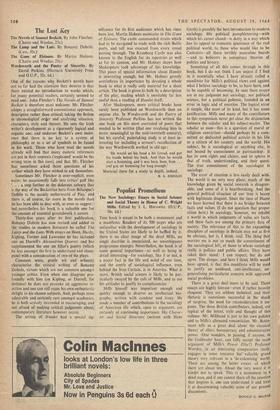Populist Prometheus
The New Sociology: Essays in Social Science and Social Theory in Honor of C. Wright Mills. Edited by I. L. Horowitz. (0.U.P., 58s. 6d.) THIS book is meant to be both a monument and a manifesto. Readers of its 500 pages who are unfamiliar with the development of sociology in the United States are likely to be baffled by it; there is no clear image of the dead Mills, no single doctrine is enunciated, no unambiguous programme emerges. Nevertheless, the book is of some general importance—as well as being in detail interesting—for sociology, like it or not, is a major fact in the life and mind of our time, and the centi'e of sociological influence, even behind the Iron Curtain, is in America. What is more, British social science is likely to be par- ticularly swayed by the cult of Mills, and to use his attitudes to justify its complacencies.
Mills himself was important enough and quirky enough to deserve an intellectual bio- graphy, written with candour and irony. He made a number of contributions to the sociology of American life which, open to argument, are certainly of continuing importance. His Charac- ter and Social Structure (written with Hans Gerth) is possibly the best introduction to modern sociology. His political pamphleteering—with which his career closed—is dotty in a way which has its appeal to romantic ignorance of the real political world, to those who would like to be Castroists—all those terribly masculine beards —and to believers in conspiracy theories of politics and history.
Something of all this comes through in this
book, but I do not think I am unjust if I find in it essentially what I have already called a manifesto for Mills's political views and against what I believe sociology to be, to have been, and to be capable of becoming. In sum these essays are in my judgment not sociology, nor political science, but a political polemic, founded in an error in logic and of emotion. The logical error is simple, like most of its kind, but it has some justification. Mills and many of the contributors to this symposium never get clear the disjunction between the scholar and his subject-matter. The scholar as man—this is a question of moral or religious conviction—should perhaps be a com- mitted or dedicated political activist in his life as a citizen of his country and the world. His subject, be it sociological or anything else, is not bound by commitment or partisanship: it has its own rights and claims, and its sphere is that of truth, understanding, and their quest. The true commitment of the sociologist is sociology.
The error of emotion is less easily dealt with.
The world is no very easy place, much of the knowledge given by social research is disagree- able, and some of it is heartbreaking. And the general political situation of our time is heavy with legitimate disquiet. Since the time of Hume we have learned that there is no bridge between facts and values. (I do not question that propo- sition here.) In sociology, however, we inhabit a world in which judgments of value are facts, and these facts are among the primary data of society. The relevance of this to the expanding discipline of sociology in Britain may not at first be obvious, but is, I think, real. The thing that worries me is not so much the commitment of the sociological left, of those to whom sociology really is politics and public affairs. They have taken their stand : I can respect, but do not agree. The danger, and here I think Mills would have agreed, is that this manifesto will be used to justify an unideaed, anti-intellectual, an- generalising particularist concern with approved social problems.
There is a great deal more to be said. These essays are highly literate—even if rather heavily eloquent. They are seldom technical, and their rhetoric is sometimes successful in the shock of surprise, the need for reconsideration it im- poses. The three British contributors, indeed, are typical of the intent, style and thought of this volume. Mr. Miliband is just to his own politics and to Mills's alienated romanticism. Mr. Botta- more tells us a great deal about the classical theory of elites, bureaucracy and administrative power. (One wonders, in passing, if anyone, in the Goldwater hour, can fully accept the main argument of Mills's Power Elite?) Professor Worsley, in an interesting comparative study, engages in some tentative but valuable grand theory very relevant to a `de-colonising' world. These are among the better essays -of which there are about ten. About the very worst it is kinder not to speak. This is a monument to a dead man, and if one cannot share all the emotion that inspires it, one can understand it and treat it as documenting valuably some of our present discontents.
DONALD G. MacKAE


































 Previous page
Previous page